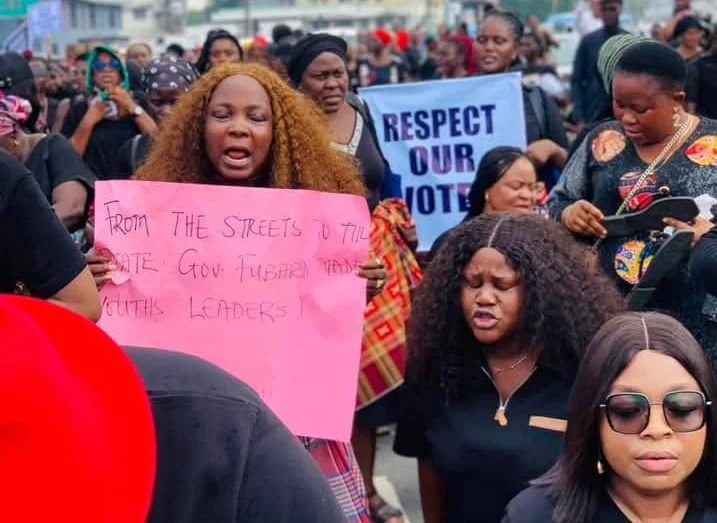The political landscape of Rivers State, Nigeria, has been embroiled in controversy following the suspension of Governor Siminalayi Fubara, his deputy, Ngozi Odu, and members of the Rivers State House of Assembly. This action, taken by President Bola Tinubu on March 18th, was accompanied by the declaration of a state of emergency and the subsequent appointment of retired naval chief, Ibok-Ete Ibas, as the state’s sole administrator. These developments have sparked widespread discontent, particularly among women in the state, who took to the streets of Port Harcourt in a fervent demonstration to voice their disapproval and demand the restoration of democratic governance.
The protest, which unfolded on a Friday morning, saw a large contingent of women marching through the streets of the state capital, their voices rising in unison as they chanted slogans and brandished placards bearing messages such as “We need our democracy restored,” “#BringBackFubara,” “Obey the rule of law,” and “Save our democracy.” Their impassioned pleas reflected a deep-seated concern for the perceived erosion of democratic principles in their state. The women’s actions underscored their belief in the importance of due process and their unwavering support for the elected officials who were abruptly removed from office.
The demonstration culminated in a march to the Rivers State Government House, the symbolic heart of the state’s political power. There, at the seat of government, the women reiterated their demands, calling for the immediate reinstatement of Governor Fubara and an end to the state of emergency, which they viewed as an unconstitutional usurpation of power. Their presence at the Government House served as a powerful visual representation of their unwavering resolve to challenge what they perceived as an injustice against their elected representatives.
The protest, captured in videos circulating widely on social media platforms like X (formerly Twitter), showcased the women’s unwavering commitment to their cause. Their voices, captured in these digital snippets, echoed the sentiments expressed on their placards, conveying a palpable sense of urgency and frustration. The videos, which served as a digital megaphone for their grievances, offered a glimpse into the charged atmosphere of the protest and underscored the women’s determination to be heard.
The underlying cause of this political upheaval remains shrouded in ambiguity, with limited information available regarding the specific reasons behind President Tinubu’s decision to suspend the elected officials and impose emergency rule. This lack of clarity has fueled speculation and heightened anxieties among the populace, contributing to a sense of uncertainty and distrust in the political process. The women’s protest, therefore, can be interpreted not only as a call for the reinstatement of their chosen leaders but also as a demand for transparency and accountability from those in power.
The women’s demonstration represents a significant moment in the ongoing political drama unfolding in Rivers State. Their collective action serves as a powerful testament to the enduring spirit of civic engagement and the importance of citizen participation in holding those in power accountable. The protest underscored the critical role of women in Nigeria’s political landscape and their determination to defend the principles of democracy, even in the face of adversity. It remains to be seen how the government will respond to these impassioned pleas for the restoration of democratic governance in Rivers State.














